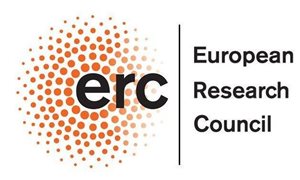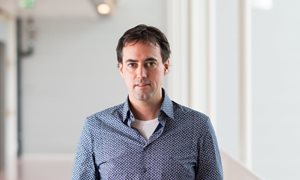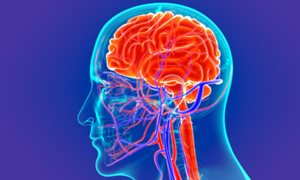.jpg.aspx?width=500&height=389&ext=.jpg&type=BlockColumn1Zoom1)
At first glance, it does not seem to make a difference whether or not patients with a specific cardiac arrhythmia, atrial fibrillation, who had an intracerebral haemorrhage while they used anticoagulants, restart anticoagulants or not. With either option, the risk of stroke or death due to a vascular cause was similar. This result emerges from research co-led by Radboud university medical center and UMC Utrecht, now published in The Lancet Neurology. The study calls for a large follow-up study to provide insight into whether or not anticoagulation should be given in specific subgroups of these patients.
Patients with atrial fibrillation, a heart rhythm disorder in which the heart beats irregularly and often faster than normal, are often given anticoagulation to ensure that blood does not clot as quickly, thus reducing the risk of ischaemic stroke (caused by a clogged blood vessel). However, anticoagulation increases the risk of a brain haemorrhage, which occurs when a blood vessel in the brain ruptures.
Complicated dilemma
A complicated dilemma, then, for patients and their doctors. “Do we prescribe this anticoagulation again to a patient with this cardiac arrhythmia after a brain haemorrhage, with the risk of another haemorrhage? Or do we not, which then increases the risk of an ischaemic stroke?” explains Professor of Neurology Karin Klijn. In the past, most practitioners tended not to prescribe the medicine again, but there was a lack of good evidence for this. Klijn: “The available scientific studies only looked retrospectively at how patients fared. Doctors had therefore already made a choice as to whether or not to prescribe anticoagulation, based on, for example, age and other characteristics. A study in which patients were randomly allocated to one of the two treatments and that then compared the two groups, was therefore lacking.”
In the absence of scientific evidence, the assumption for a long time has been: let's stop giving these patients anticoagulation. “But perhaps as practitioners we have been too afraid of new brain haemorrhages”, Klijn says. We have hardly found any new treatments to improve outcome after brain haemorrhage in the past 30 years. Intracerebral haemorrhages account for around 15% of all strokes. “We need to increase our knowledge”, Klijn says, “not only about acute treatments but also about secondary prevention, that is, preventing cerebral haemorrhages, cerebral infarctions and other vascular diseases after a haemorrhage in the brain.”
So Radboud university medical center and UMC Utrecht, led by Klijn and her colleague from Utrecht Professor of Neurology Bart van der Worp, started the APACHE-AF study with 14 other centres. In APACHE-AF they studied the effect of prescribing a new anticoagulation (apixaban), or no anticoagulation, in patients with atrial fibrillation who had experienced a haemorrhage in the brain while on anticoagulation. 101 persons participated in this study. The question was: do they develop new health problems, such as another intracerebral haemorrhage, a cerebral infarction or other vascular disease resulting in death?
Initial indications call for follow-up research
The result? No difference was found between the two groups. All study participants were at high annual risk of a new stroke or death due to vascular diseases, regardless of whether they were on anticoagulation or not. The risk for one group did not appear to be greater than for the other. Reason for follow-up. Klijn: “Our goal was to provide initial indications for the level of the risk of new strokes or death from vascular disease in these patients. We succeeded in doing so. Now larger follow-up studies are needed, in which we must zoom in on subgroups. Then we can better determine whether and what role factors like sex, age and other patient-specific characteristics play. That's what we're going to continue with now, together with colleagues from other countries.”
About the publication in The Lancet Neurology
Apixaban versus no anticoagulation after anticoagulation associated intracerebral haemorrhage in patients with atrial fibrillation in the Netherlands (APACHE-AF): a randomised, open-label, phase 2 trial – Floris H B M Schreuder, Koen M van Nieuwenhuizen, […], Berber Zweedijk, Ale Algra, Jan Willem van Dalen, L Jaap Kappelle, Gabriel J E Rinkel, H Bart van der Worp, Catharina J M Klijn.
-
Want to know more about these subjects? Click on the buttons below for more news.
More information
Pauline Dekhuijzen

wetenschaps- en persvoorlichter
Related news items

NWO Stevin Prize for expert on Parkinson’s disease Bas Bloem Major scientific prize for societal impact on research into Parkinson's disease
17 June 2022 Neurologist Bas Bloem of Radboudumc receives this year’s Stevin Prize of the Dutch Research Council (NWO). The Stevin Award is the highest distinction in science for a researcher in the Netherlands who has achieved particular success in the area of knowledge utilization for society. go to page
The future of laboratory animal research More attention to living conditions of laboratory animals
16 May 2022 On May 9, a meeting took place at the Radboudumc as a result of the launch of the Dutch Transparency Agreement on Animal Testing. The Radboudumc is one of the twenty signatories and has thus committed itself to openly and transparently communicate its vision and policy with regard to animal testing. go to page
European grants for groundbreaking Radboudumc research Professors Roshan Cools and Peter Friedl receive ERC Advanced Grant
26 April 2022The European Research Council (ERC) is awarding grants to Roshan Cools and Peter Friedl, both professors at Radboudumc. While Cools will investigate how brains control behaviour in (stressful) situations, Friedl will work on developing a new cancer therapy.
go to page
Erno Hermans appointed professor of Cognitive Affective Neuroscience
13 April 2022Hermans unravels the effects of stress on the brain, and uses that knowledge to develop preventive training programs that increase resilience.
go to page

